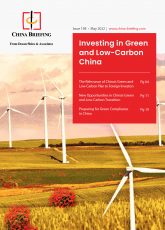Investing in Green and Low-Carbon China – New Issue of China Briefing Magazine
The latest issue of China Briefing Magazine, titled “Investing in Green and Low-Carbon China” is out now and available as a complimentary download on the Asia Briefing Publication Store.
In this issue:
- The Relevance of China’s Green and Low-Carbon Plan to Foreign Investors
- New Opportunities in China’s Green and Low-Carbon Transition
- Preparing for Green Compliance in China
China’s transition to a green, low-carbon, and circular economy will have far-reaching socioeconomic, industrial, and business impact as economic and consumer behavior will be directly related to the country’s progress in tackling climate change and environmental degradation.
China’s government has announced ambitious carbon emissions targets in recent months. To achieve these goals, top policymakers are writing the frameworks to guide the country’s green transition and sustainably secure a low-carbon economy. In this regard, China is actively seeking technology know-how and innovation-based expertise; the country is also leveling the production playing field. It is projected that as a result of this pivot, China’s market for green goods and services will be among the largest in the world.
Moreover, while foreign investors may have been hesitant to enter China’s clean energy market in the past due to sops enjoyed by domestic companies, preferential government procurement practices, and inconsistent levels of transparency – this is changing. China has been opening associated sectors to foreign participants and rolling back local eligibility factors.
Also to note is that companies based in China, including foreign entities, will increasingly come under greater pressure to reduce their carbon footprints across their value chains.
In the past, despite reforms to environmental laws, proper implementation often stood in the way of China’s progress in this area. That is expected to change as ambitious green targets demand stricter regulatory standards, transparent monitoring, and overall better policy implementation.
Hence, businesses can no longer stick with the status quo. Depending on their industry and business scope – companies are advised to prepare ahead of time and make necessary changes to their production, sourcing, and operations to avoid risks from a sudden transition.
Nevertheless, China’s green transition does open doors to new opportunities, especially for foreign enterprises.
Market openings to encourage companies offering access to advanced technologies and implementing best industry practices, more financing options, and changes in regulatory policies – are cumulatively leveling the playing field for local and international players – and will make the growth potential of green industries more attractive than ever.
In this issue of China Briefing magazine, we demonstrate the opportunities and risks involved in China’s green and low-carbon transition. We also investigate some of the industries where the government has sought to attract foreign capital and know-how. Finally, we summarize major green compliance requirements and provide tips on meeting these targets and relevant environmental standards.
To know more about the implications of China’s green and low-carbon transition on your businesses or new investment opportunities in associated industries in China, please feel free to contact our experts at china@dezshira.com.
About Us
China Briefing is written and produced by Dezan Shira & Associates. The practice assists foreign investors into China and has done so since 1992 through offices in Beijing, Tianjin, Dalian, Qingdao, Shanghai, Hangzhou, Ningbo, Suzhou, Guangzhou, Dongguan, Zhongshan, Shenzhen, and Hong Kong. Please contact the firm for assistance in China at china@dezshira.com.
Dezan Shira & Associates has offices in Vietnam, Indonesia, Singapore, United States, Germany, Italy, India, and Russia, in addition to our trade research facilities along the Belt & Road Initiative. We also have partner firms assisting foreign investors in The Philippines, Malaysia, Thailand, Bangladesh.
- Previous Article Preparing to Resume Your Businesses in Shanghai: A Practical Guide
- Next Article Reshoring from China to Mexico – How Prevalent is it Really?










